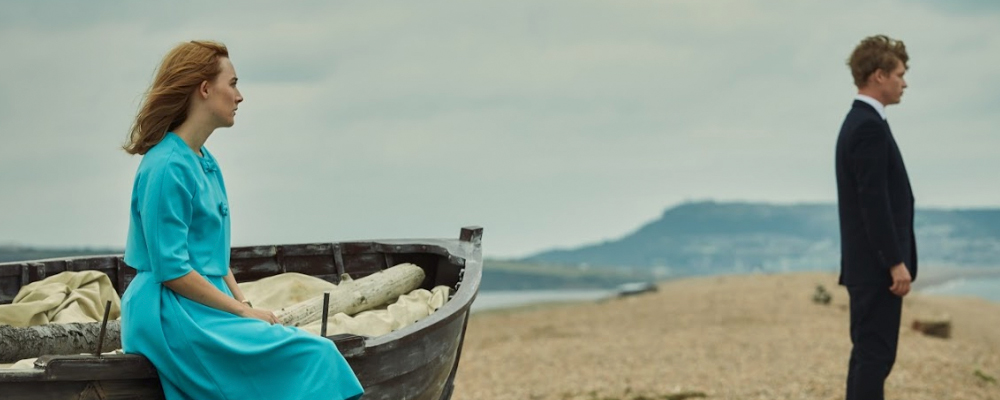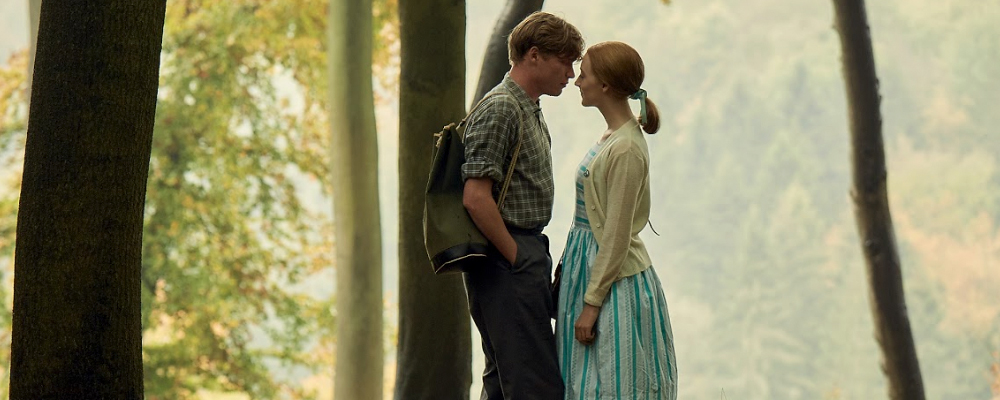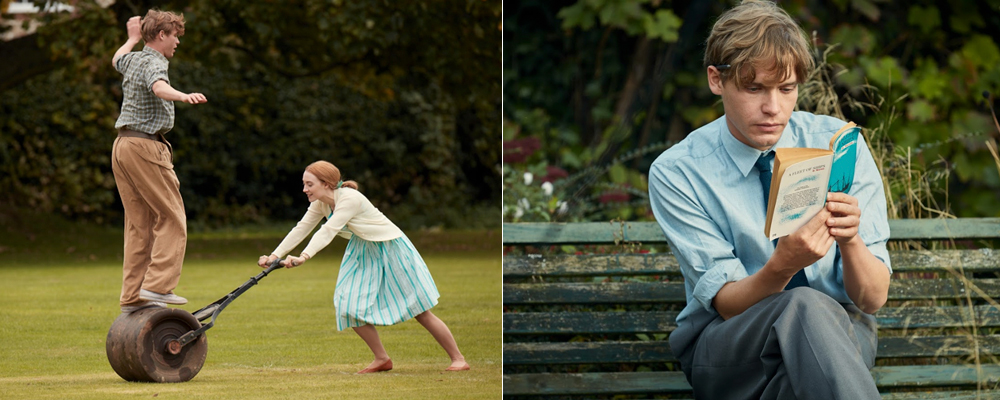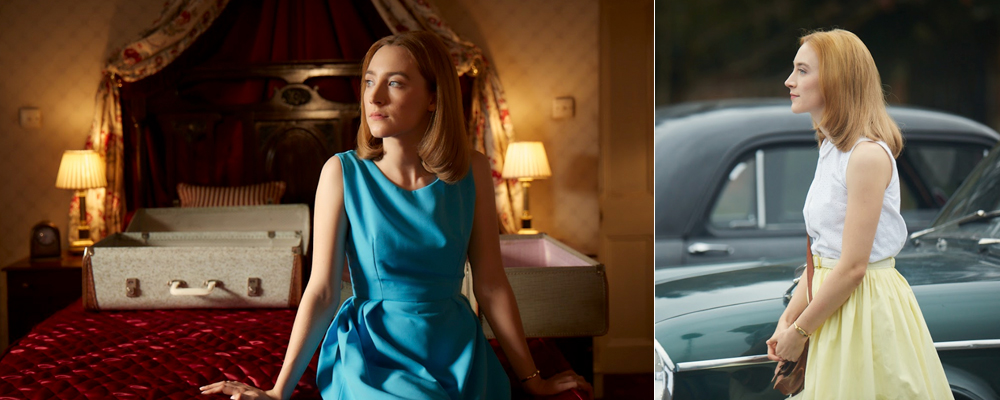Saoirse Ronan Deals With Unspeakable Difficulties in Dominic Cooke’s Emotional ‘On Chesil Beach’
Sandra Miska
At age 24, with three Oscar nominations under her belt, Saoirse Ronan is undoubtedly one of the most gifted young actresses working today, and now nod number four appears to be on the horizon with her devastating turn in “On Chesil Beach.” Just as was the case with the film that started off her illustrious career, “Atonement,” “On Chesil Beach” is an adaptation of a novel by Ian McEwan, who is considered by many to be one the greatest British writers of the past 50 years. While “Atonement” was an epic film that spanned several years, “On Chesil Beach,” is a more intimate story, with the main narrative taking place during the span of a few hours at a seaside hotel in 1962 Britain. The film centers around two newlyweds, “square” violinist Florence (Ronan) and idealistic history lover Edward (Billy Howle). As both are virgins, there is much awkwardness in the beginning, something that is initially played for laughs. The tension broken up by flashbacks to their year-long courtship, mostly idyllic scenes that contrast with the somewhat stifling situation in the honeymoon suite. What starts off as something of a romantic dramedy turns into something else entirely as layers are peeled back and the couple are confronted with issues that were, as difficult as they would be to discuss openly today, unspeakable in 1962.
“On Chesil Beach” is the feature debut of Dominic Cooke, a veteran theater director who also helmed the BBC Shakespeare mini-series “The Hollow Crown: The War of the Rose.” Based in London, Cooke spoke with Entertainment Voice over the phone about his experience in making this emotionally impactful and engrossing film.
“I just liked that fact that it wasn’t a conventional story,” he revealed when asked what attracted him to the script, which McEwan himself wrote. “It was talking about a [subject matter], I suppose, that is still taboo, which is that relationship between people’s physical lives and their emotional lives, and it does that is such a delicate way.”
Something that becomes apparent as the film progresses is the disconnect between Florence’s feelings for Edward and her sexual desires, or rather lack thereof. While she is by all appearances very much in love with her fiancé, as he is with her, she has a fear of sex that goes beyond the usual first-time jitters. A possible victim of sexual abuse at the hands of her blowhard father (Samuel West), Florence appears to have what we today would call sexual aversion disorder. While the social norms of the time in which she lives may not have caused her condition, they certainly compound her difficulties, and one cannot help but feel for her, as her only resource is a generic sex manual, and propriety makes talking about sex impossible. With her mother (Emily Watson) being stuffy and distant, her only confidante is her younger sister, Ruth (Bebe Cave), whose more tender age accounts for her disgust at passages describing engorged male body parts and women being “entered.” Ronan is funny and endearing in this scene, but Florence’s distress is apparent, and one cannot help but feel for this young woman as she realizes that something is different about her, a feeling that causes a cloud of gloom hangs over her during what is supposed to be one of the most exciting times of her life, her engagement.
Ronan and Howle, a relatively unknown actor at the moment, but that is about to change, have excellent chemistry together. They previously played a very different pair of lovers in “The Seagull,” a film that was shot a year before “On Chesil Beach,” and the comfort level between them is evident in the scenes in which they are basking in the glow of first love.
“It was a really great experience,” said Cooke of working with the pair. “The two of them clicked. They had great chemistry together. They totally understood who those people where…. I think the thing that was so lovely about them is that they were great fun to work with, but at the same time very serious about what they were doing, and open. It was a really enjoyable experience working with them.”
Cooke spoke at length about how his previous endeavors prepared him for his first feature, recalling, “‘The Hollow Crown’ was a brilliant apprenticeship in working on camera. It was hugely demanding to tell the story of the War of the Roses in six hours with Shakespearean language was very difficult but wonderful to do… This is a different kind of a challenge because it’s so intimate. In some ways, if you have lots of people running around with swords killing each other as they did in ‘The Hollow Crown,’ that’s easier to do, because there’s so much physical action. As long as your tracking that with your camera, it’s going to be dynamic, where as trying to find dynamism with just two people sitting at a table is in some ways harder, but, keeping the tension is all about how you keep the inner life of the characters very strong, while playing the external, that very placid English reserve. Keeping those two things going is what keeps the awkwardness and the tension alive in that hotel room, and that became very important.”
It is in this enclosed space of the hotel room where Florence and Edward’s relationship starts to unravel. This constricting environment contrasts greatly from the picturesque outdoor locations in which their love first flourished, as the viewer sees in beautiful and tender flashback scenes. Cooke spoke about the importance of nature in the film.
“We wanted the natural world to be the only place where they were really comfortable together, when they were away from all the structures that had been created by their parents and by the society they were in, so when they were out in the woods and in the fields and even on the cricket pitch, it was somewhere where they could really be themselves.”
Ultimately, Florence’s aversion, Edward’s immaturity, and the communication issues between the newlyweds leads to a heartbreaking scene on Chesil Beach, another nature setting that amplifies the mood, one that is so emotionally raw and frustrating that it is sure to induce tears from many. Ronan as Florence is especially phenomenal in these final scenes, really allowing her vulnerability to take a hold of her.
With a page count of less than 200, the book “On Chesil Beach” is considered to be rather short as far as novels go, which meant that instead of condensing the story, which is the case with most adaptations, McEwan was able to expand upon his work for the film. One main departure from the source material is the film’s coda, which is comprised of two flashforwards in which the fates of Edward and Florence are revealed, and they are less ambiguous than in the book, but just as emotionally impactful. Cooke, who worked with McEwan on the final draft, explained that the reasoning behind this was to make clear how the choices made during the wedding night impacted that rest of their subsequent lives, particularly Edward’s.
“[We needed to put] Edward’s choice into a context and seeing what the consequences were. We really wanted that to play out fully for the audience… Part of what the film is about is a moment in someone’s life that defines the rest of their life, so really to see the rashness of Edward’s decision and his stubbornness, you needed to see what the cost of that was.”
Cooke went on to explain how the time in which they lived contributed to the Florence and Edward’s unluckiness, saying, “They were just born at the wrong moment, just before the cultural revolution of the sixties… What would have happened if they were born [in the seventies]? Things might have been different for them.”
A takeaway from both the film and novel is that with love, patience, and openness, Florence and Edward (and the viewer) would have been spared much heartache. A term that has only come into the collective consciousness in recent years, “toxic masculinity,” is one that can be used to accurately describe some of Edward’s behavior. With the behaviors that have given rise to the #MeToo movement, are people really that much more enlightened about sex that they were 56 years ago?
“[There are some ways in which] we are much more evolved,” weighed in Cooke. “Whether individuals go down this route or not, there are, in our society, more [available resources] for insight and understanding in a deeper way. It is possible now to have conversations about sex and intimacy, but these things are still very difficult, as it’s recently been brought to our attention, this idea of toxic masculinity is still very much alive in our society, and the conversation around intimacy and sex is still very gendered. There are lots of differences, but there are still, sadly, many similarities. The only conversation that you see about sex [in the film] is between the two women around the book… But the men, when they’re talking about sex, it’s in a competitive, joshing way, not taking it seriously. I think those things still go on, very much. We see that in our society. There are still a lot of those issues around today.”
What does Cooke hope viewers learn from Edward and Florence’s story?
“I think there are various things. The film is partly a plea for us to look at the difficult stuff and be open and honest with ourselves and with each other about intimacy, about the painful bits of our past that we don’t want to own up to.”
Cooke went on to discuss how “On Chesil Beach,” a period film without the nostalgia for a bygone era, resonates in the era of resistance.
“[The attitude is] let’s not go back. The past is not as lovely as it seems. I think, nowadays, we’re in a time where a lot of people think they would rather go back to a previous time, but actually even these kids [who are from privileged backgrounds], they still are shaken in a very negative way by the kind of repressed and unhappy culture that has been given to them by their parents. I would rather move forward and try to move into a time where we can be more frank and honest. The scandals around the #MeToo movement and everything recently have actually opened up the need for openness and honesty… The film is very much in that vein, it’s about the need for honesty.”
“On Chesil Beach” opens May 18 in New York and Los Angeles, expanding to select cities May 25. A complete list of dates and theaters is here.





